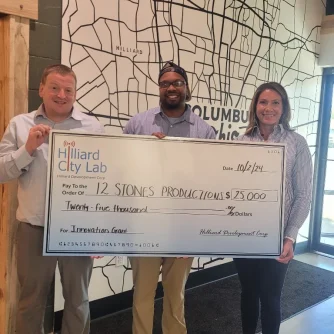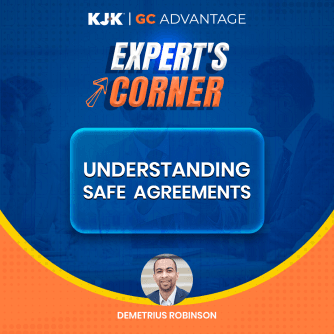For startups, intellectual property and proprietary information are often among their most valuable assets. Protecting these secrets is critical, especially when building relationships with investors, partners, or even early team members. One of the most common tools used to safeguard confidential information is a Non-Disclosure Agreement (NDA). To better understand NDAs and how startups can use them effectively, Elio Harmon, Host of the 614Startups Podcast, sat down with Demetrius Robinson, Startup Legal Partner with KJK. Here’s their conversation, packed with actionable insights for entrepreneurs.
Elio Harmon:
Demetrius, welcome back to the show! Let’s start with the basics for our readers. What exactly is an NDA, and why is it important for startups?
Demetrius Robinson:
Thanks for having me again, Elio! A Non-Disclosure Agreement, or NDA, is a legally binding contract that establishes a confidential relationship between two or more parties. It ensures that the information shared between them—whether it’s trade secrets, business strategies, or financial data—remains private and is not disclosed to third parties without permission. NDAs are crucial for startups because they help protect proprietary information, especially during early-stage discussions with potential investors, partners, or vendors. Without an NDA, you risk losing control of your intellectual property, which could seriously harm your competitive edge.
Elio Harmon:
That makes sense. But NDAs are often seen as a formality. What are the key elements of an effective NDA that founders should pay attention to?
Demetrius Robinson:
That’s a great question. A well-crafted NDA should include a few essential elements:
- Definition of Confidential Information: Clearly outline what information is considered confidential. This can include business plans, customer lists, technical data, or product designs. Be specific to avoid disputes later.
- Obligations of the Receiving Party: Spell out what the other party is allowed to do with the information and what they’re prohibited from doing—like sharing it with third parties or using it for their own benefit.
- Exclusions from Confidentiality: Specify what doesn’t count as confidential, such as information that’s already publicly available or independently developed without using the disclosed information.
- Duration of the Agreement: Set a reasonable time frame for how long the confidentiality obligations last. Typically, this ranges from two to five years, depending on the nature of the information.
- Remedies for Breach: Include provisions for what happens if the NDA is violated, such as seeking injunctive relief or damages.
These elements ensure the NDA is enforceable and tailored to protect your startup’s interests effectively.
Elio Harmon:
NDAs sound straightforward, but I’ve heard of scenarios where they aren’t enforceable. What are some common mistakes founders make when drafting or using NDAs?
Demetrius Robinson:
You’re absolutely right—poorly drafted NDAs can be unenforceable, and that’s a big risk. One common mistake is using overly broad or vague language, which courts might find unreasonable. For example, saying that everything shared is confidential without defining specifics can make the NDA harder to enforce.
Another mistake is neglecting to tailor the NDA for the specific situation. Using a one-size-fits-all template may not adequately address your startup’s needs or comply with local laws.
Lastly, many founders fail to properly track who has signed an NDA and what information was shared. If you can’t prove what was disclosed and when, enforcing the agreement becomes much harder. The key is to work with a legal expert to ensure the NDA is clear, specific, and appropriate for the circumstances.
Elio Harmon:
That’s great advice. Now, NDAs are often used during investor discussions. Should founders always ask investors to sign one before pitching their ideas?
Demetrius Robinson:
This is a tricky one, Elio. While NDAs are a critical tool, they’re not always practical when dealing with investors, especially venture capitalists. Most VCs won’t sign NDAs during initial pitches because they see so many deals and don’t want the legal risk of accidentally breaching confidentiality. Instead, founders should focus on sharing enough to pique interest without revealing trade secrets.
That said, if you’re entering deeper negotiations or sharing highly sensitive information, it’s fair to revisit the conversation about an NDA. For other stakeholders—like contractors, advisors, or early partners—NDAs are more common and often necessary.
Elio Harmon:
You’ve given us a lot to think about, Demetrius. Before we wrap up, what practical steps can founders take to make NDAs an effective part of their overall strategy for protecting intellectual property?
Demetrius Robinson:
Absolutely. Here are a few practical tips:
- Use NDAs Strategically: Don’t rely on them for everything. Combine NDAs with other strategies like filing patents or securing trademarks to protect your intellectual property comprehensively.
- Be Organized: Keep a log of all signed NDAs, including the parties involved and the date of the agreement. This makes it easier to enforce them if needed.
- Tailor Your NDAs: Work with a lawyer to draft NDAs that fit specific scenarios—whether it’s for investors, contractors, or employees. One size doesn’t fit all.
- Educate Your Team: Make sure everyone on your team understands the importance of NDAs and follows protocols for sharing sensitive information.
- Follow Up: If you believe someone has breached an NDA, act quickly to address the situation. Delaying enforcement can weaken your position.
By taking these steps, startups can use NDAs as an effective tool to protect their secrets without slowing down their progress.
Elio Harmon:
Demetrius, this has been an enlightening conversation. Thanks for breaking down NDAs and showing us how startups can use them effectively. For those looking to learn more or get legal advice, where can they reach you?
Demetrius Robinson:
Thanks for having me, Elio! If any founders need help with NDAs or other legal matters, they can find me at KJK.com or connect with me on LinkedIn. I’m always happy to help startups protect what makes them unique.
Elio Harmon:
Fantastic. Thanks again, Demetrius! And to all our readers, NDAs are a powerful way to protect your startup, but only if used correctly. Stay tuned for more insights here on the 614Startups Podcast.







